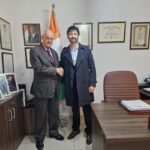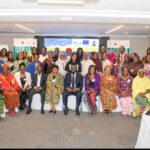ECOWAS Suspends Guinea-Bissau, Adopts Mediation with the Military Junta, Urges ESSMGB to Protect Institutions.
By Raymond Enoch
The Economic Community of West African States (ECOWAS) has today 27th November 2025.suspended Guinea-Bissau from all its decision-making bodies following a military coup that disrupted the country’s democratic process barely days after presidential and parliamentary elections.
In a swift extra ordinary meeting held virtually ,the Mediation and Security Council at the level of Heads of State and Government on Thursday, the regional leaders condemned in the strongest terms the coup d’état of 26 November 2025 and demanded the immediate restoration of constitutional order in the Republic of Guinea-Bissau.
Chaired by H.E. Julius Maada Bio, President of the Republic of Sierra Leone and Chairperson of the Authority of ECOWAS Heads of State and Government, the high-level session, brought together several West African leaders, including:
H.E. Jose Maria Pereira Neves, President of Cabo Verde, H.E. John Mahama, President of Ghana H.E. Joseph N. Boakai, President of Liberia
H.E. Bola Ahmed Tinubu, President of Nigeria
H.E. Bassirou Diomaye Faye, President of Senegal
H.E. Julius Maada Bio, President of Sierra Leone
H.E. Tiemoko Meyliet Koné, Vice President of Côte d’Ivoire
They were joined by foreign ministers from Benin, The Gambia and Togo, as well as senior representatives of regional and international institutions, including:
H.E. Omar Alieu Touray, President of the ECOWAS Commission
H.E. Mahmoud Ali Youssouf, Chairperson of the African Union Commission
H.E. Leonardo Santos Simão, Special Representative of the UN Secretary-General and Head of UNOWAS
H.E. Dr. Carlos Pinto Pereira, Minister of Foreign Affairs of Guinea-Bissau
H.E. Baba Kamara, ECOWAS Special Envoy on Terrorism and Head of the ECOWAS Election Observation Mission to Guinea-Bissau.
Deep Concern over Interrupted Democratic Process
In its communiqué, the Mediation and Security Council expressed “deep concern” over the unfolding political crisis, noting that it comes at a time when Bissau-Guineans had once again demonstrated “resilience and commitment to democracy” by turning out to vote in presidential and parliamentary elections held on 23 November 2025.
ECOWAS described the coup as an “illegal abortion of the democratic process” and a “subversion of the will of the people of Guinea-Bissau,” firmly rejecting any arrangements that would entrench military rule or legitimize the seizure of power.
The regional bloc demanded the immediate and unconditional release of all detained officials, with particular emphasis on President Umaro Sissoco Embaló, electoral officials and other political figures currently in custody
The Council insisted that the coup leaders must respect the will of the people by allowing the National Electoral Commission to proceed without delay with the declaration of the results of the 23 November elections.
Furthermore, ECOWAS categorically held the coup leaders “individually and collectively responsible” for the safety of all citizens and residents of Guinea-Bissau, as well as for the security and physical integrity of all detainees.
Acting under the provisions of the 2001 ECOWAS Protocol on Democracy and Good Governance, the Mediation and Security Council announced the suspension of Guinea-Bissau from all ECOWAS decision-making bodies until full and effective constitutional order is restored.
The communiqué stressed that ECOWAS “reserves the right to use all options” provided for by its instruments, including the 2001 Supplementary Protocol and the 2012 Supplementary Act on Sanctions, targeting all entities deemed responsible for disrupting the electoral and democratic process in Guinea-Bissau. This opens the door to political, economic and individual sanctions should the junta fail to comply.
In tandem with its punitive measures, ECOWAS opted for an intensive diplomatic track, mandating the Chair of the Authority, President Julius Maada Bio, to lead a High-Level Mediation Mission to Bissau The Mission will comprise:
H.E. Faure Essozimna Gnassingbé, President of the Council of Togo
H.E. Jose Maria Pereira Neves, President of Cabo Verde H.E. Bassirou Diomaye Faye, President of Senegal. They will also be accompanied by the President of the ECOWAS Commission, Omar Alieu Touray.
The mandate of the delegation is to engage directly with the military authorities in Guinea-Bissau to secure a rapid, peaceful, and full restoration of constitutional order and the reinstatement of the democratic process.
ECOWAS urged the Armed Forces of Guinea-Bissau to “return to barracks” and confine themselves strictly to their constitutional role, warning against any attempt to interfere further in political and electoral processes.
In a clear message of zero tolerance for unconstitutional changes of government, the Council reiterated that the military has no mandate to arbitrate electoral disputes and must instead allow constitutional and judicial mechanisms to operate
Also as part of immediate security measures, the Mediation and Security Council directed the ECOWAS Stabilization Support Mission in Guinea-Bissau (ESSMGB) to continue supporting the protection of national institutions.
The Council further called on the coup leaders to guarantee the safety and facilitate the evacuation and safe passage of ECOWAS and all other international election observers currently in the country.
The communiqué concluded by affirming that the ECOWAS Mediation and Security Council will remain seized of the situation in Guinea-Bissau and will closely monitor developments, ready to deploy the full range of regional mechanisms to defend democracy, constitutional order and the expressed will of the Guinean Bissau people.
With this firm stance, ECOWAS sends yet another strong signal across West Africa that coups and unconstitutional power grabs are unacceptable and will be met with swift diplomatic, political and, where necessary, coercive measures to safeguard democratic governance in the region.









